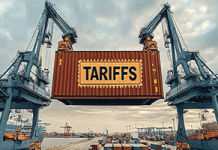Proposed Rule Will Hurt California Jobs, Emission Reduction Goals
 The South Coast Air Quality Management District (SCAQMD) is considering a detrimental rule that would limit the import and export of goods from the ports of Los Angeles and Long Beach, hurt California jobs and have a devastating effect on the Southern California economy.
The South Coast Air Quality Management District (SCAQMD) is considering a detrimental rule that would limit the import and export of goods from the ports of Los Angeles and Long Beach, hurt California jobs and have a devastating effect on the Southern California economy.
A large coalition of more than 100 organizations, which include the California Chamber of Commerce and groups representing sectors involved in all aspects of goods movement, is urging the mayors of Los Angeles and Long Beach to reject SCAQMD’s proposed rulemaking.
Proposed Cap on Cargo
The SCAQMD, a regional air quality agency representing Los Angeles, Orange, Riverside and San Bernardino counties, is seeking to enact a Port Indirect Source Rule (ISR) for the ports of Los Angeles and Long Beach by December 2023. This rule would cap cargo volumes at the nation’s busiest container gateway.
The agency is not mandating specific equipment upgrades or technology enhancements, nor is it setting emission limits for individual supply chain elements, as the California Air Resources Board has done in the past. Instead, SCAQMD is setting hard target dates for total emission reductions on all supply chain components and making those reductions the responsibility of the ports and terminal operators, regardless of whether they have a contractual relationship with those entities.
In addition, the ISR would extend the jurisdictional boundaries of emission reduction to 40 nautical miles for ocean vessels, the first place of rest for cargo moving by truck, and to Banning, California, for cargo moving by rail, all of which would become the responsibility of the port or terminal.
Impact on Economy, Essential Goods
In an opposition letter, the coalition pointed out that the rulemaking’s volume cap on port activities will restrict the delivery of critical imported goods, including essential construction, manufacturing and automobile components, as well as medical supplies and halt the export of California’s manufactured goods and agricultural products to foreign markets.
The proposed ISR would also affect port jobs and revenues, the coalition warns. The Port of Long Beach alone supports $11.9 billion in federal, state, and local taxes. The Port of Los Angeles estimates that 1 in 12 jobs in Los Angeles and Long Beach, as well as 1 in 9 jobs in the counties of Los Angeles, Orange, Riverside, San Bernardino and Ventura are connected to the ports, and as many as 3 million jobs nationwide.
“The Ports are among the best sources of high-paying, secure jobs and our local communities, schools, hospitals and small businesses depend on the jobs that our vibrant port complex produces,” the Coalition said.
Counterproductive to Emissions Reduction Efforts
The coalition also warned that the proposed ISR is counterproductive to additional zero-emission reduction efforts and will actually increase greenhouse gas (GHG) emissions by forcing the diversion of cargo to other, less environmentally conscious, North American trade gateways.
In a commentary for the Journal of Commerce, Pacific Merchant Shipping Association President John McLaurin pointed out that multiple studies have shown that GHG emissions increase when cargo from the Far East moves through East and Gulf coast ports instead of landing on the West Coast.
The ISR would also inhibit the ability of the local supply chain to finance the equipment and infrastructure upgrades necessary to transition to zero-emission infrastructure, defeating the purpose of California’s zero-emission strategies and the ports’ Clean Air Action Plan (CAAP), the coalition said.
Furthermore, many of the gateways referred to above are located in states that compete directly with California economically, but do not share California’s goals. The shifting of supply chains and the economic vitality that follows, from San Pedro Bay to other gateways, will undoubtedly have numerous unintended consequences.
“We urge the cities of Los Angeles and Long Beach to carefully analyze and oppose SCAQMD’s proposed ISR and provide federal, state, and local elected officials with critical information about the operation and widespread negative impacts of the proposed ISR,” the coalition said.
In his commentary, McLaurin pointed out that efforts in California have already resulted in impressive emissions reductions across all segments of the supply chain, and, as a result, California ports are the cleanest in the world.
“The ports and the private sector are experimenting with alternative fuels, battery electric and hydrogen terminal and truck equipment, and new operational standards and technologies. This progress will continue, but future success will require well thought out policy directives,” McLaurin said.
In contrast, the proposed ISR would only hurt California’s GHG reduction efforts, and drive imports and exports — and tens of thousands of jobs — elsewhere, he said.


